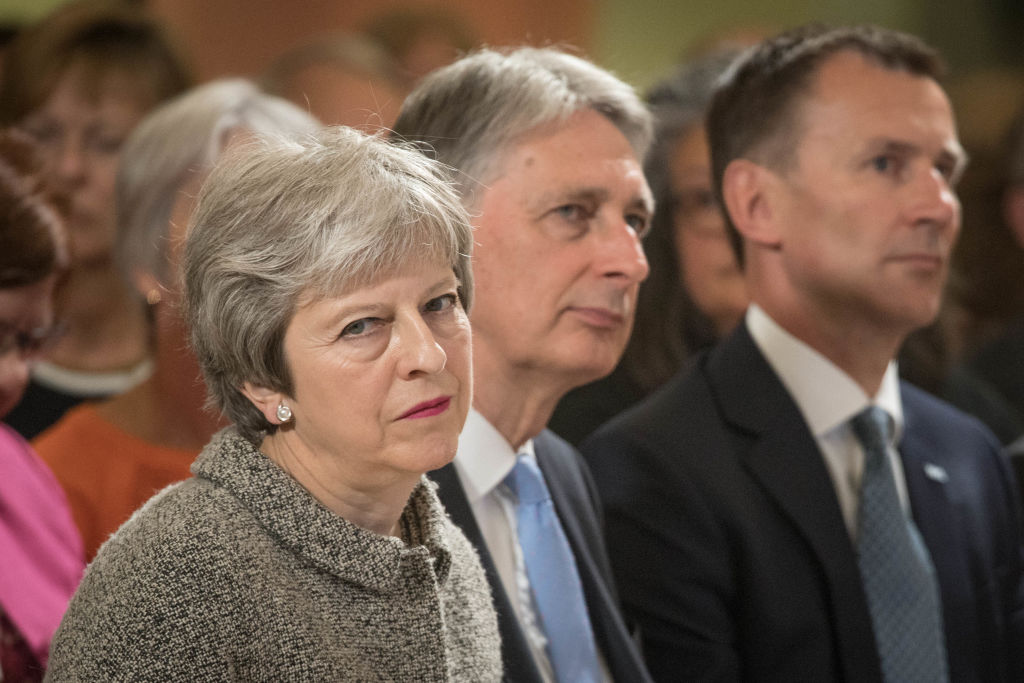There has been a Remainer coup. Remainers now inhabit virtually all of the highest offices in the land. Overnight, adherents to this minority political viewpoint seized the final levers of political power. This is the one downside — and what a downside it is — to the belated outbreak of principle among the cabinet’s Brexiteers: their walking away has allowed Theresa May to further surround herself with fellow Remainers, and pretty much expel the Brexit outlook from her cabinet.
The new foreign secretary, Jeremy Hunt, voted Remain. As did his replacement at the Department of Health, Matt Hancock. Hancock is a former acolyte of George Osborne, arch-Remainer and now chief media ridiculer of Brexit via his newspaper the Evening Standard.
These two join the PM herself, the Chancellor of course, the Home Secretary, the Defence Secretary, the Justice Secretary, and the Minister of the Cabinet Office as Remain voters who now find themselves running Brexit Britain. The last one on that list, David Lidington, who oversees all of cabinet’s business, is known for being an especially enthusiastic backer of the EU: he once branded the Brexit vote a ‘massive risk’. These lifelong supporters of the EU are now in charge of getting Britain out of the EU. It doesn’t compute.
Of course, the new Brexit Secretary, Dominic Raab, is a Leaver. But given that we know, from the sidelining and mistreatment of David Davis, that the civil service has a larger hand in our negotiations with Brussels than the Brexit Secretary does, one wonders whether Raab’s Leave beliefs will make much difference. It is testament to how stiffly bureaucratic Theresa May has become that she turned an unprecedented people’s vote against technocracy into a technocratic exercise, best overseen by nameless men in paper-strewn backrooms rather than by politicians who might have a whiff of ideological conviction about them.
Does it matter that Remain voters now dominate the corridors of power? Yes. Enormously. First, from a practical perspective, it makes it less likely that Brexit — our real, meaningful exit from the European Union — will happen. Brexit will be softened, which is to say undermined: turned from a passionate cry for democratic independence into a bureaucratic exercise of pursuing slow-motion semi-divergence from the EU while actually kind of staying-in.
That is what May’s Chequers plan that proved to be the breaking point for Davis and Boris really represents: Remain by another name. As Boris put it in his scathing and brilliant letter of resignation, under May’s proposals we are ‘truly headed for the status of a colony’ in which ‘we are not actually going to be able to make our own laws’. If cabinet is dominated by Remain voters, by people who fundamentally think Brexit is wrong and that EU oversight of our economic affairs is a solid idea, then there is no brake that can be applied to May’s selling-out of the vote for Brexit. Our Remainer leaders’ instincts will have free rein.
The second reason the Remainer coup matters is for what it tells us about today’s political class — that it is astonishingly distant from public opinion; that it is as removed from the beliefs and passions of ordinary people as any political class in modern British history has been. The schism is vast now: 17.4m people, the largest democratic bloc in British history, vote to leave the EU, and yet our political institutions are dominated by people who voted to stay in the EU.
The new cabinet is hugely Remain-leaning. Seventy-three per cent of MPs voted Remain. It is even worse in Labour: a staggering 95 per cent of Labour MPs voted Remain, compared with 48 per cent of the public. And this is apparently a party of the people, of ‘the many’. Do me a favour. It is hard to recall a time when Labour has been so cut adrift from the ideals and concerns of such a vast swathe of British society.
So yes, that Brexit Britain is ruled by Remainers matters. It tells us an incredibly important story about the moral and political chasm that now separates the ruling class from everyday people. Anyone genuinely interested in democracy should not be laughing about the sidelining of the Brexit worldview, far less cheering on Remainer politicians as they weaken Brexit; they should be asking how British politics came to be dominated by people who think so differently, so very differently, to the man and woman in the street.







Comments